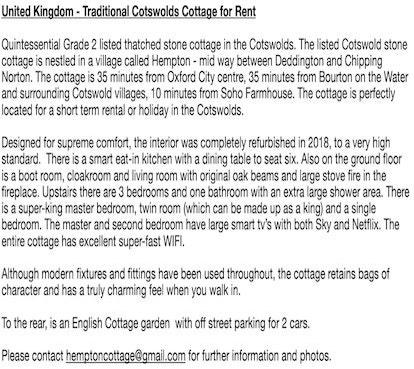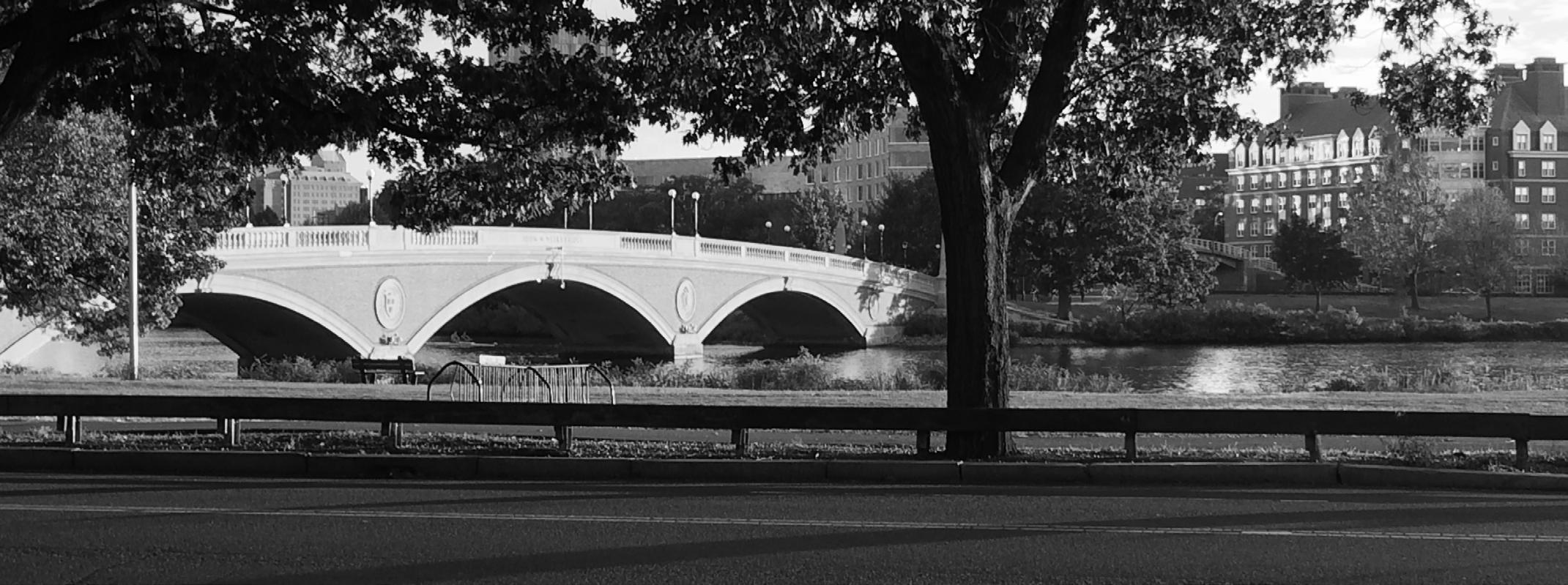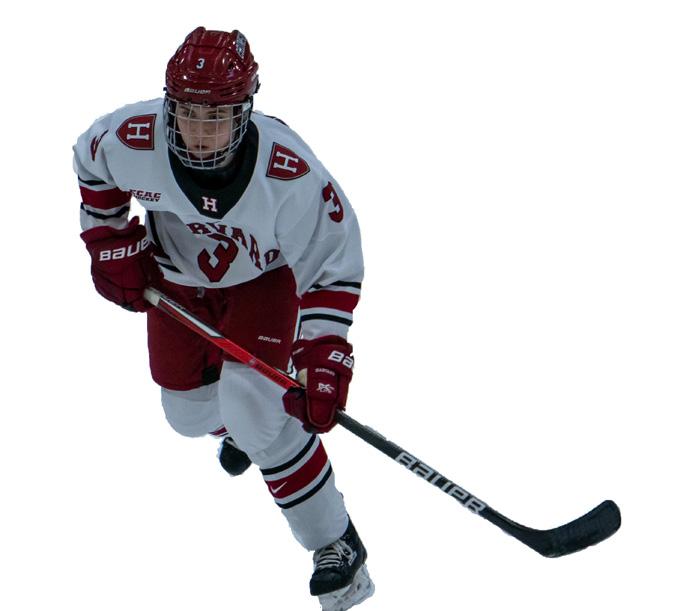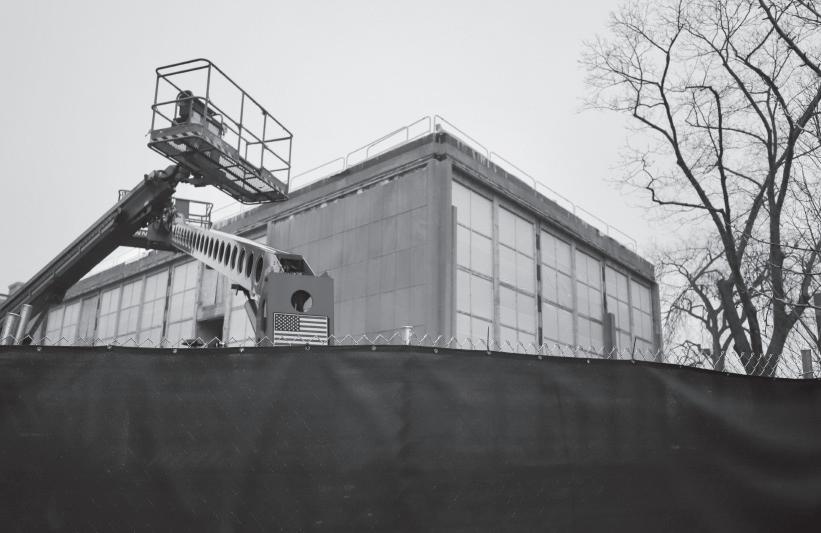
15 minute read
News
Sanders Wins Primary, Buttigieg Takes Second PRIMARY FROM PAGE 1
that he gets any additional momentum from winning because this should be a state that he should win pretty easily,” Rogowski said.
Massachusetts residents will cast their ballots on March 3, as one of 14 states to vote on Super Tuesday.
Buttigieg — a former leader of Harvard’s Institute of Politics who served as the mayor of South Bend for eight years — came within a small margin of Sanders Tuesday. After a strong performance in the Iowa caucuses last week, Buttigieg surged in New Hampshire polls and surpassed former U.S. Vice President Joseph R. Biden Jr. Biden finished in fifth place on Tuesday.
“I think that you saw a very large percentage of those people that were making up their minds in the last week — or even the last couple days — were breaking in Buttigieg’s favor,” Rogowski said.
“And that’s largely because of the very strong showing that he had out of Iowa, which puts him in a good position to expand his campaign network of operations to sort of take his pitch to a more national stage,” he added Rogowski said Warren failed to sustain the support she garnered in New Hampshire earlier in the race.
“Not a good night at all for Elizabeth Warren,” he said. “I think it came down to in part
Jon C. Rogowski Government Professor
that she peaked too early.”
U.S. Senator Amy Klobuchar (D-Minn.) overperformed her polling average Tuesday and finished in third place behind Buttigieg.
U.S. Senator Michael Bennett (D-Colo.) and entrepreneur Andrew Yang both dropped out of the race Tuesday.
Harvard College Democrats for Andrew Yang President Michael Zhu ’22, who worked for the Yang campaign over winter break and canvassed for him in New Hampshire, said he was disappointed to see Yang drop out.
“I think he ran a very wellrun campaign, did so many things right,” Zhu said Tuesday . “Him — and even Evelyn Yang, his wife — are truly role models for Asian Americans like myself.”
“I think that politics is not generally an area that Asian Americans are known to make strides in, but Andrew Yang really has moved that entire discussion,” Zhu added.
Rogowski, who was in New Hampshire for Tuesday’s primary, cautioned that the outcome of the Democratic nomination is “far from a foregone conclusion.”
“We’re all focused on New Hampshire at the moment, and we were all focused on Iowa a week ago,” he said. “But a lot of voters in South Carolina and places like Nevada and the Super Tuesday states haven’t really tuned in to the same degree yet.”
jasper.goodman@thecrimson.com
Sciences Dean Says Faculty Search Aimed at Diversity
By ETHAN LEE CRIMSON STAFF WRITER
Dean of Science Christopher W. Stubbs said in a Friday interview that he is planning to hire two new junior faculty members after engaging in a search that sought out job candidates specifically for their teaching, scholarship, and ability to strengthen “diversity, inclusion, and belonging” in the Sciences division.
The faculty search is one of several efforts recently undertaken by the Faculty of Arts and Sciences to diversify its ranks and increase academic support for students, Stubbs said. In 2019, just five percent of tenured faculty in the Sciences division reported that they are underrepresented minorities, according to the University’s most recent Faculty Development and Diversity report.
“Increasing the representational distribution across our faculty is a top priority, and above and beyond that, making sure that Harvard is a place where everyone comes to our campus is in a position to thrive – those are both top priorities for FAS and for our division,” Stubbs said Friday.
Stubbs also said he believes that cultural improvements within FAS — and specifically the Sciences division — will help to increase faculty diversity.
“I think, as we take steps to strengthen the climate and culture within our division, we’ll find that the demographic numbers change, and conversely, as our demographics shift, my expectation is that our culture will shift also,” Stubbs said. “They’re intimately related to each other in my opinion.”
Stubbs also said he thought recent remarks by John S. Wilson Jr., a senior adviser and strategist to Harvard’s president, served as only further reinforcement of Stubbs’s commitment to promoting a more welcome environment in the Sciences. Wilson cited the legacy of Martin Luther King Jr. in calling for increased diversity across the University, according to Stubbs.
“He explicitly challenged us in the Sciences to continue to help this nation evolve from the path that Dr. King set out for us all, and that was an incredibly inspirational event by all accounts of people who attended,” Stubbs said.
Stubbs pointed to several methods that administrators have undertaken, including the University-wide Pulse Survey conducted last year, to better assess issues of inclusion and belonging on campus.
Over three quarters of Pulse Survey respondents reported that they feel that they belong at Harvard — but that figure was lower for certain demographic groups, including black and Latinx students.
Stubbs also noted that individual departments have conducted “very exhaustive” internal surveys to better focus their efforts.
“Other departments have in place ‘inclusion and belonging committees’ that are carrying out that work,” Stubbs said. “Other departments are thinking about putting together focus groups, and I’m encouraging each of our departments and units, through whatever mechanism they deem most appropriate, to undertake self-reflection leading to plans for action for the coming years.”
Stubbs said he believes addressing diversity, though, goes beyond just demographic data. “The demographic results are a little biased by what question you ask,” Stubbs said. “I think layered on top of that is the importance of people who come here feeling like they’re included, and feel like they belong.”
ethan.lee@thecrimson.com
The T closes. We don’t.
Breaking news, 24/7.
The Crimson thecrimson.com
Grad Student Herzog Dies at 27
By MICHELLE G. KURILLA CRIMSON STAFF WRITER
Harvard Medical School student Andrew V. A. Foley is afraid of heights. Nevertheless, he once found himself on the top of a rock face in Western Massachusetts, helped up by his friend Mark B. Herzog.
Foley said he knew he was holding Herzog, an experienced climber, back from more difficult heights. But Herzog insisted on climbing as a pair.
“Eventually, he got me to the top to sit on this ledge with him,” Foley said. “He had made sandwiches so that we could sit there and eat lunch together.” Herzog — who Foley described as “one of the happiest people” he has ever met — was a fifth-year graduate student enrolled in the joint M.D. and Masters of Public Policy program at Harvard Medical School and Harvard Kennedy School. Passionate about spending time outdoors and improving rural medical care, he died in late January at age 27.
He is survived by his mother, his father, his four brothers, his three sisters, two nephews, his girlfriend, his great aunt, and his friends and mentors at Harvard. John Herzog, his brother, wrote in an email that Mark showed a deep devotion to improving rural primary care and a passion for climbing.
“His mind was always going with new thoughts about school, his research, and the future, but climbing allowed him to have complete focus on the task at hand and forget about everything else,” he wrote. “It gave him a chance to escape the urban life of North Carolina or Boston and find some wild areas. The physical aspect was also important to him as were the views and serenity that he seemed to find at the top of an excellent climb in a beautiful place.”
He added that his brother took advantage of opportunity where he could find it, making friends “both on and off the mountains.”
“Mark always took advantage of every opportunity and adventure he could find, but more importantly commanded an extraordinary ability to bring people together, encouraged others with his contagious humor, and cared deeply about their lives and stories,” he wrote. After graduating magna cum laude from Duke University with a bachelors in public policy studies and with minors in biology and chemistry, Herzog began his studies at Harvard in 2015. He was both a Jerome H. Grossman Graduate Fellow and a National Health Service Corps scholar.
Despite his glowing resume, Herzog’s friends and family said he was more interested in connecting with people and working to improve healthcare in America than accumulating accolades.
David Liebers, who worked on a rural health policy project with Herzog, said Herzog was the type of person to bike for an hour just to catch up for 15 minutes with a close friend.
“He was incredibly talented at finding ways to reconnect and rebuild communities,” Liebers said. “Family and friends were his number one passion.”
Danika Barry, one of Herzog’s former housemates and friends in the joint M.D.-M.P.P. program, said he turned his own experiences growing up in rural Appalachia into a “driving passion” to improve rural healthcare.
“I think central to that was really to affirm the dignity of the people in rural areas, seeing that they had an absolute right to the best quality healthcare,” she said.
Hailing from the border of Tennessee and Virginia, Herzog sought to improve the health system in towns like his own. He worked on rural health research projects with the Rosebud Sioux reservation in South Dakota, the Navajo Nation in New Mexico, in the Appalachian region, as well as internationally in Guatemala, Kenya, and New Zealand. While sorting through items Herzog left in storage, Barry said she found a book of haikus he wrote. “Pause. Loosen the grip / Breathe, relax into the moves / Smile climb with joy,” one read, according to a website dedicated to his memory.
“It was a practice of reflection and gratitude,” Barry said of the poems. “Part of his impact is inspiring others to live more mindfully, more effectively and still find ways to access joy and gratitude no matter what.”
HMS Dean for Medical Education Edward M. Hundert wrote in an email that Herzog improved the lives of those who knew him.
“Mark was a shining light who elevated everyone around him — his classmates and friends, our faculty and staff, his patients, and everyone he met,” Hundert wrote. “His passion for improving rural health care was an inspiration — he was on a mission to make the world a better place, and we all owe it to his life and memory to follow his beautiful example.”
John Herzog wrote that he believes his brother would want people to remember him by following his example.
“I feel like the best way to truly remember Mark would be for people to live the way that he did - to spend the extra minute getting to know someone, to have an adventure whenever you can, and to value those around you at all times,” he wrote.
michelle.kurilla@thecrimson.com
HUPD FROM PAGE 1 Police Union Files NLRB Complaint
a statement it released.
Last month, The Crimson published an investigation that found repeated instances of racism and sexism within HUPD over the past 28 years. In lawsuits, discrimination complaints, and interviews, current and former officers alleged that the department’s leadership disciplines employees differently based on their personal relationships with top department figures as well as retaliates against officers who speak out about the culture within HUPD.
Several days after the investigation, HUPD Chief Francis D. “Bud” Riley announced in an email to department employees that he will launch a review into his department — the fourth formal assessment of HUPD during Riley’s reign as chief of Harvard’s police force.
Student activists called for Riley’s resignation at a rally Saturday.
In his email sent on Monday to HUPA members, Allen wrote he was disappointed Harvard failed to engage with the union to resolve their dispute, leading the union to seek recourse with the federal government.
“Maybe something could have been worked out collectively if we had said meeting(s),” he wrote.
ema.schumer@thecrimson.com
Like The Crimson on Facebook.
Facebook.com/ TheHarvardCrimson
The latest on music, film, theater, and culture.
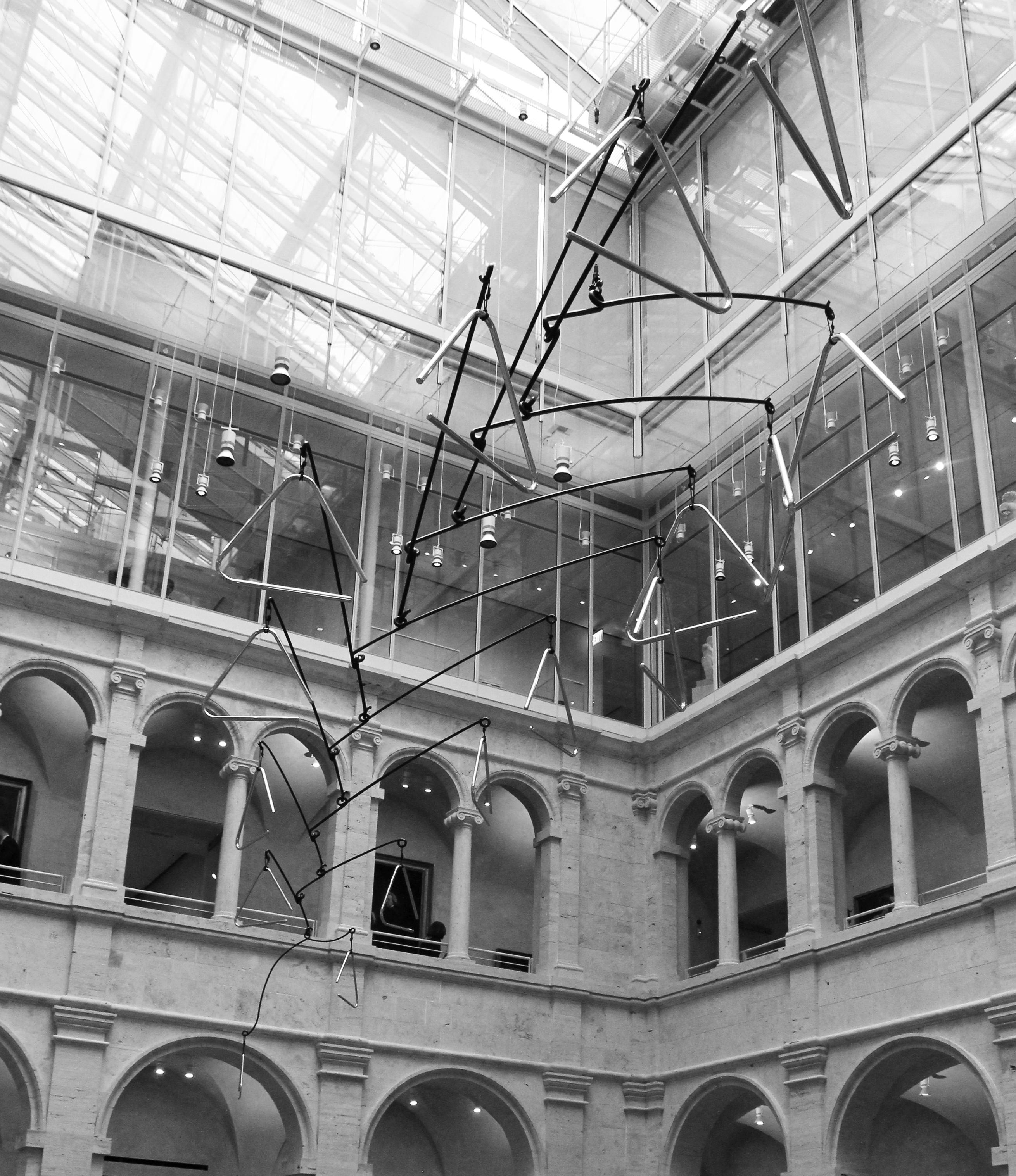
That’s artsy.
The Crimson thecrimson.com/arts
Cambridge Mayor Sumbul Siddiqui recently championed a resolution to rename the city’s Aggasiz neighborhood. RYAN N. GAJARAWALA—CRIMSON PHOTOGRAPHER
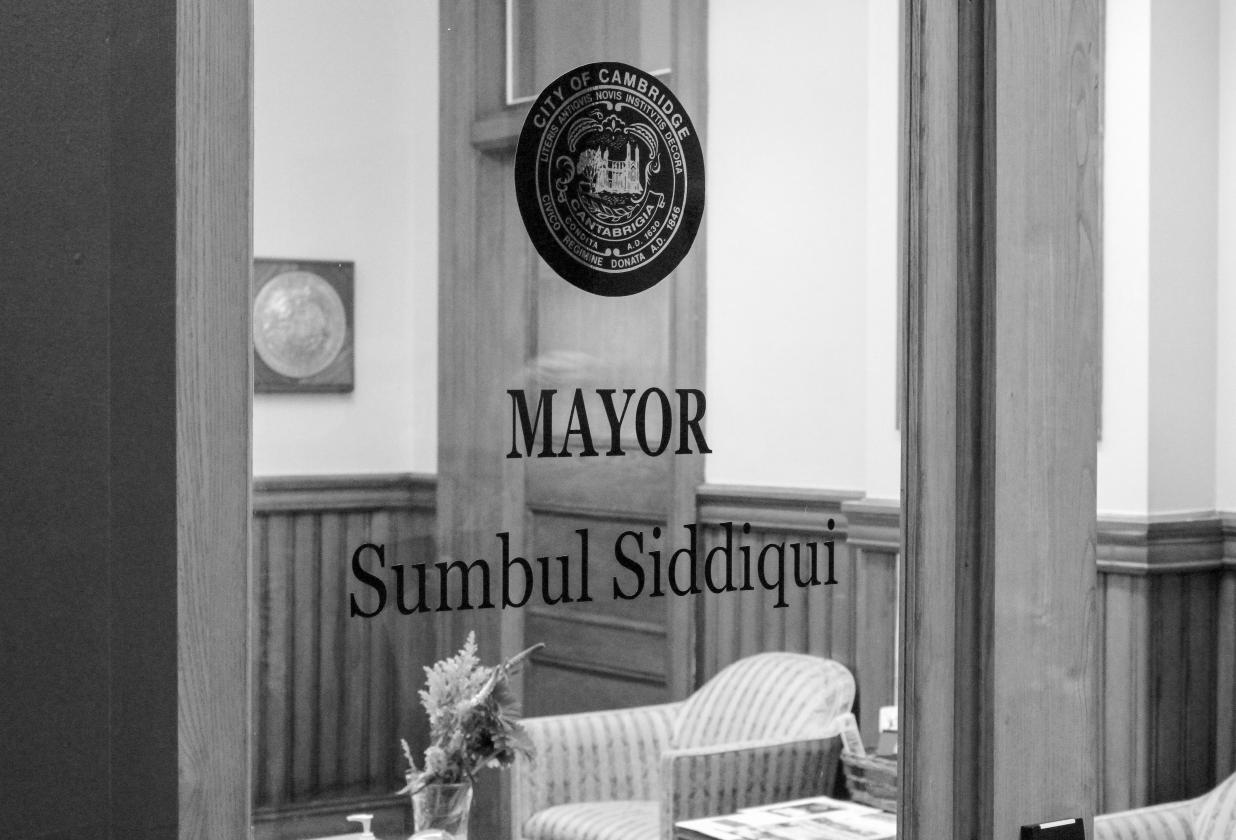
Agassiz Name Change Approved by Council AGASSIZ FROM PAGE 1
letter to University President Lawrence S. Bacow in June imploring him to turn over the photos to Lanier. The lawsuit remains pending.
Councilor E. Denise Simmons, who co-sponsored Monday’s policy order to rename the Agassiz neighborhood, applauded Counter for her efforts at the meeting.
“There’s so much more that we need to do to make these important corrections, because we do not want ourselves or our children or our grandchildren walking through the streets of someone so heinous and so disrespectful, for lack of a better way of putting it,” Simmons said,
Councilor Patricia M. Nolan ’80 said Cambridge should account for its own history as elected officials throughout the country reckon with their cities’ complicated pasts.
“We often think when we talk, for instance, about confederate monuments that we don’t have a similar thing right here in Cambridge,” she said. “So it’s really important that we’re doing exactly this, which is addressing our own history in a positive way.”
The Council will now move forward with a formal process to rename the neighborhood.
At Monday’s meeting, Counter suggested renaming the neighborhood after Maria L. Baldwin, the first African American school principal in New England.
At Harvard, campus buildings, museums, and named professorships still bear the Agassiz name.
Harvard faculty and staff, however, maintain that those titles pay homage to the contributions of his wife and son and not the scientist himself.
ema.schumer@thecrimson.com charles.xu@thecrimson.com
By BRIE K.BUCHANAN and ELIZABETH X. GUO CRIMSON STAFF WRITERS
New concentrators in Harvard’s School of Engineering and Applied Sciences celebrated their concentration declarations at the fourth annual SEAS Sophomore Convocation in the Science Center Tuesday evening.
Dean of SEAS Francis J. Doyle III kicked off the convocation by welcoming attendees and sharing statistics about the SEAS Class of 2022.
The incoming sophomore class of 367 students is the largest group to declare SEAS concentrations in the school’s history, Doyle said.
“Half of you picked Computer Science,” Doyle said, to chuckles from the audience.
Doyle also emphasized his commitment to diversity at SEAS in his remarks. Describing the current gender imbalance within the School — which comprises 38 percent women and 62 percent men — Doyle insisted that SEAS administrators are “not going to rest until we really reflect the College.”
Doyle also showed attendees video and photo previews of the new SEAS Complex in Allston, which is set to open for classes in fall 2020. He said the space is intended to be “not only a facility for all of SEAS, but also for all of Harvard.”
The landscaped courtyard behind the complex will be comparable in size to Harvard Yard, Doyle added.
“We have space for student clubs,” he said. “We never before had dedicated space for the offices of various student groups. We have garages for the car projects and robotics projects. We have a flying laboratory for drones, two and half stories tall. We have a makerspace.”
Later on in the event, three SEAS graduates — Kharma C. Foucher ’96, Michael A. Mancinelli ’15, and Trisha R. Paul ’13 — spoke on an alumni panel about their Harvard experiences and post-graduation careers.
Mancinelli urged students in the audience to “test hypotheses” and explore a wide variety of opportunities to discover their interests.
“Those internships or summer research experiences are a great way to kind of apply the scientific method and do some hypothesis testing — what type of industries are you interested in?” Mancinelli said. “Test the hypothesis and keep collecting data points and develop your passion.”
In a reception held after the panel, the concentrators spoke with representatives from various student organizations — including the Harvard Undergraduate Robotics Club and Harvard Computer Society — and met fellow SEAS concentrators. Speakers address sophomores at a School of Engineering and Applied Sciences convocation event Tuesday evening. PEI CHAO ZHUO—CRIMSON PHOTOGRAPHER
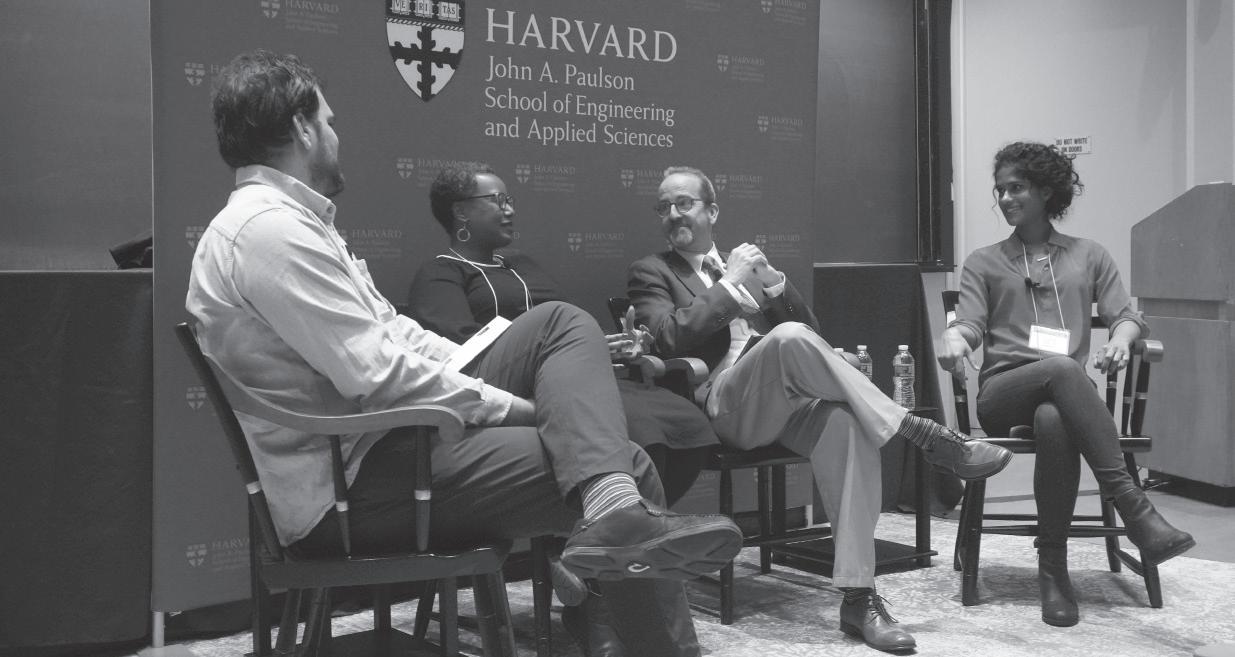
“Every time that Dean Doyle speaks, I get so excited about what the future of SEAS is,” Emmy Semprun ’22, who attended the reception, said. “Even showing us Allston and how much we have grown from when it started and we weren’t here.”
Semprun also said she appreciated the diversity of the alumni panel and enjoyed hearing about the experiences of women in engineering.
“My favorite thing also about this is there was a panel of three people and two of them were women, and they were women of color, which is incredible to see, especially as a girl in engineering,” she said.
“Like, sometimes you kind of get lost in the crowd, so it’s always great,” she added.
Spencer C. Rolland ’22, another newly declared SEAS concentrator, said he appreciated how the alumni panel offered insight into the connection between life as a Harvard undergraduate and life after graduation.
“Specifically for me, having the panel up there of the graduates and seeing what their story was through Harvard and then what their story was afterwards,” Rolland said. “It kind of just gives you hope to just continue on the path that you’re on and moving forward.”
brie.buchanan@thecrimson.com elizabeth.guo@thecrimson.com
The sights and sounds of Harvard.
The Crimson @crimson_photo

Like The Crimson on Facebook.
Facebook.com/ TheHarvardCrimson
